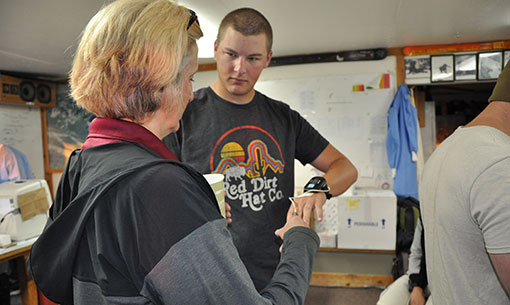Military Performance Division
The Military Performance Division (MPD) conducts research to:
- Prevent and reduce performance decrements (physical and cognitive) in training and operational environments, such as those related to musculoskeletal injuries, overburden, or occupational hazards and stressors.
- Characterize, optimize, and enhance the health and performance (physical and cognitive) of our Soldiers' to better enable them to carry out their military occupational tasks and mission, across their careers.
MPD research provides relevant, scalable, evidence-based solutions that address specific threats to medical readiness for multi-domain operations.
Research Areas
Physical Performance Optimization
- Guidance for advanced training programs
- Evidence-based performance assessment metrics
- Body composition analysis
- Soldier task performance
- Aerobic capacity analysis
Musculoskeletal Injury Reduction
- Military population-level injury investigations
- Bone health analysis (i.e., high resolution non-invasive imaging, bone finite element analysis)
- Anti-inflammatory strategies
- Injury mechanisms & biomarker studies
Return to Duty and Combat Effectivness
- Strategies for optimal return to duty following injury
- Return to combat decision making metrics
Military Biomechanics
- Load carriage impact on Soldier performance/biomechanics
- Impact of exoskeleton-like devices
- Wearable sensors application to physical movement patterns
Brain Health And Performance
- Military operational and environmental impacts on cognition and marksmanship
- Novel cognitive state assessment metrics
- Neuromodulation: neurophysiology and performance
- Military occupational chemical exposures and neurological health and cognition
Injury Epidemiology
Soldier Performance, Health, And Readiness Database (Sphere)
- Acute & chronic musculoskeletal injuries
- Anthropometric statistics
- Disability – musculoskeletal injuries
- Military population-level assessment of injury risk and trends and performance readiness
Highlighted Research
- ARIEM Reduction in Musculoskeletal Injury (ARMI) Study: Developing evidence-based, actionable recommendations to Army leadership to reduce musculoskeletal injuries in recruits without reducing training standards.
- NSAID studies: Using a three tiered approach of cellular, animal, and human research models to comprehensively examine the positive and potentially deleterious effects of non-steroidal anti-inflammatory drugs (NSAIDs) on musculoskeletal adaption to exercise
- Activity Comparison: Analyzing the use of wearable sensors to identify common Soldier physical activities, which aids in moving biomechanics research out of the laboratory into training and operational environments
- Cognitive state assessment: Developing and validating solutions for unobtrusive, ambulatory monitoring of cognitive state in military operational and training environments
- Rapid Access to Comprehensive Expertise to improve musculoskeletal injury-related outcomes (RACE2MSKI): A coordinated series of prospective research efforts assessing the impact of injury and performance specialists on health outcomes, injury reporting, and targeted education.
Last Modified Date: 7/19/2025
 An official website of the United States government
An official website of the United States government
 ) or https:// means you've safely connected to the .mil website. Share sensitive information only on official, secure websites.
) or https:// means you've safely connected to the .mil website. Share sensitive information only on official, secure websites.














